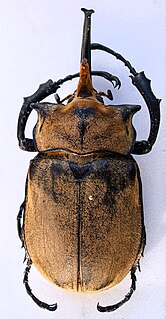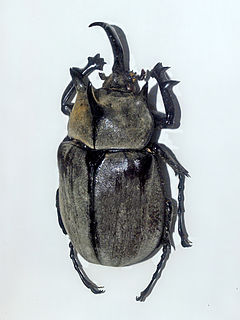
Convolvulaceae, known commonly as the bindweed or morning glory family, is a family of about 60 genera and more than 1,650 species of mostly herbaceous vines, but also trees, shrubs and herbs, and also including the sweet potato and a few other food tubers.

Dynastinae or rhinoceros beetles are a subfamily of the scarab beetle family (Scarabaeidae). Other common names – some for particular groups of rhinoceros beetles – include Hercules beetles, unicorn beetles or horn beetles. Over 1500 species and 225 genera of rhinoceros beetles are known.

The Algodones Dunes is a large sand dune field, or erg, located in the southeastern portion of the U.S. state of California, near the border with Arizona and the Mexican state of Baja California. The field is approximately 45 miles (72 km) long by 6 miles (9.7 km) wide and extends along a northwest-southeast line that correlates to the prevailing northerly and westerly wind directions. The name "Algodones Dunes" refers to the entire geographic feature, while the administrative designation for that portion managed by the Bureau of Land Management is the Imperial Sand Dunes Recreation Area. In 1966, Imperial Sand Hills was designated as a National Natural Landmark by the National Park Service. The Algodones Dunes are split into many different sections. These sections include Glamis, Gordon's Well, Buttercup, Midway, and Patton's Valley. Although the Arabic-derived Spanish word algodones translates to "cotton plants", the origin of the toponym is unknown.

The elephant beetle is a member of the family Scarabaeidae and the subfamily Dynastinae. They are Neotropical rhinoceros beetles.

Actaeon beetle is a rhinoceros beetle of the family Scarabaeidae.

Vespericola is a genus of air-breathing land snails, terrestrial pulmonate gastropod mollusks in the family Polygyridae.

Megasoma is a genus of rhinoceros beetles. Commonly known as the elephant beetles, Megasoma species are found from the southern half of North America to most of South America.

Megasoma thersites is a species of scarab beetle. It is endemic to Baja California, Mexico. Adults are attracted by light and feed on the cambium of palo verde.

Megasoma occidentale is a species of scarab beetle. It is endemic to Mexico and is known from the Oaxaca and Sinaloa states. Adults are attracted by light. Larvae have been collected in rotten coconut palm stems.

Megasoma gyas is a species of large Neotropical rhinoceros beetles. There are no recognized subspecies.

Megasoma anubis is a species of beetles belonging to the family Scarabaeidae.
Phobetus is a genus of May beetles and junebugs in the family Scarabaeidae. There are about 11 described species in Phobetus.
Megasoma punctulatum is a species of rhinoceros beetle in the family Scarabaeidae.
Megasoma vogti, known generally as the Texas elephant beetle or Texas megasoma, is a species of rhinoceros beetle in the family Scarabaeidae.
Podostena is a genus of May beetles and junebugs in the family Scarabaeidae. There are at least four described species in Podostena.
Dacoderus is a genus of narrow-waisted bark beetles in the family Salpingidae. There are about seven described species in Dacoderus.
Animal Ethics is a nonprofit organization formed to promote discussion and debate around issues in animal ethics and to provide information and resources for animal advocates. They also do outreach work in several countries on the issue of speciesism. Their aim is to create a world where moral consideration is extended to all sentient beings. The organization's website covers topics such as speciesism, sentience, veganism and wild animal suffering and has content translated into several languages.
Megasoma cedrosa is a species of rhinoceros beetle. It is endemic to Mexico and described originally from Cedros Island. The name is often misspelled as "cedrosum" or "cedros" but the original spelling is retained under ICZN Article 31.2.3, as the name is neither Latin nor Greek.
Bulimnea is a genus of gastropods belonging to the family Lymnaeidae.










